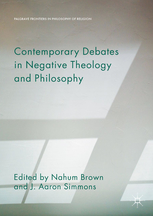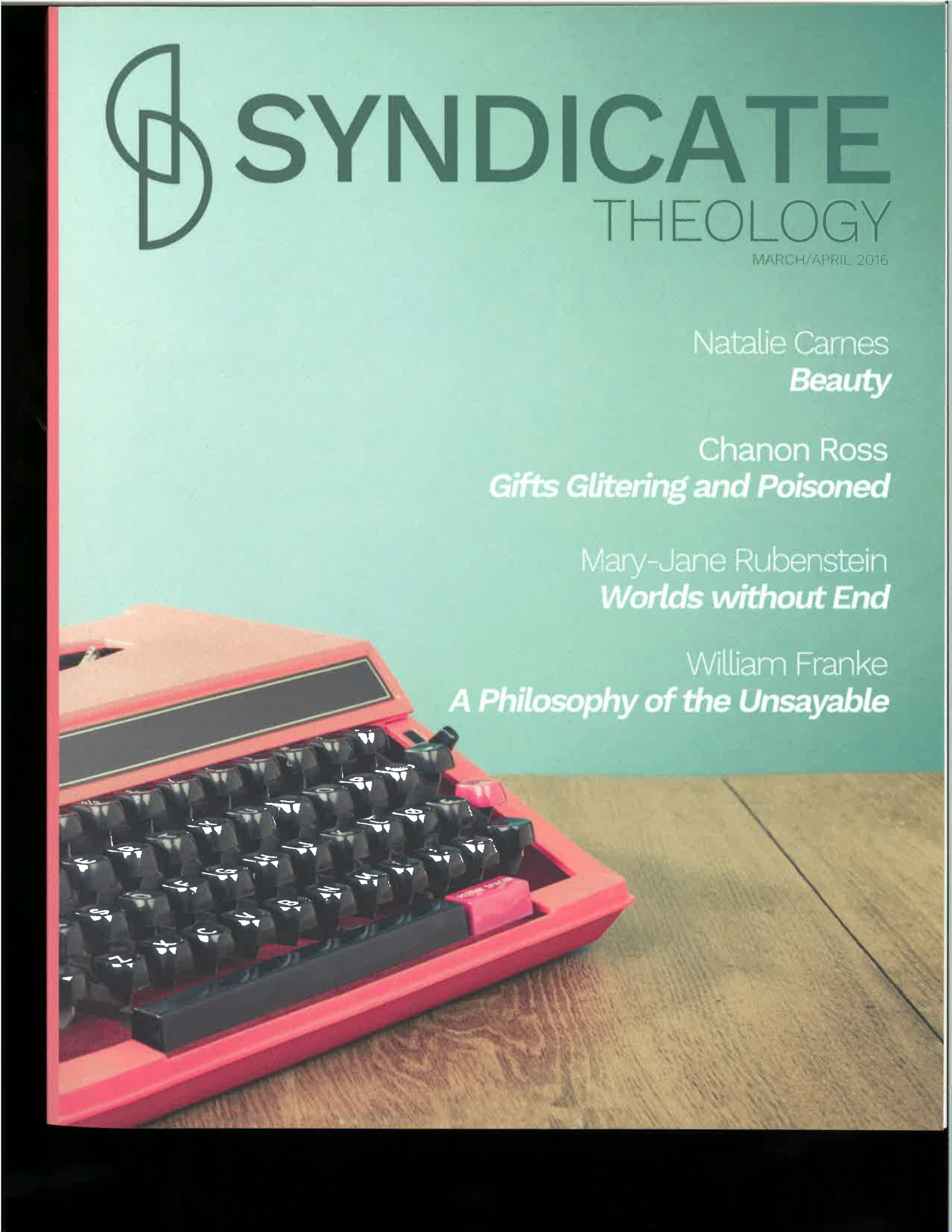Books by Others about William Franke’s Books + General Review Essays
Posted by frankewp on Monday, September 24, 2018 in News.
Books by Others about William Franke’s Books + General Review Essays
Contemporary Debates in Negative Theology and Philosophy, eds. Nahum Brown and J. Aaron Simmons (London: Palgrave MacMillan, 2017) (xi + 464 pages), Palgrave Frontiers in Philosophy of Religion Series — includes responses by William Franke to each of fourteen essays.
From J.A. Simmons, 1 Introduction: Old Questions and New Frontiers (pp. 9-11):
‘In the attempt to articulate possible alternative ways forward, this
volume unfolds in three parts. In Part I, “A Philosophy of the Unsayable:
Interpretations and Consequences,” Kevin Hart, J. Aaron Simmons,
William Christian Hackett, Sai Bhatawadekar, and Stephen R.
Palmquist all engage William Franke’s recent book, A Philosophy of the
Unsayable, which is perhaps the most sustained attempt in the literature
to sketch the contours of a thorough-going apophatic philosophy of
religion, if such a thing is possible.20 For years, Franke has been among
the vanguard of scholars trying to find ways for apophaticism to speak
to our current situation. Although he is certainly not the only person to
move in this direction—many other scholars in various disciplines have
also been working in similar areas, for example, consider the work of
Wendy Farley, Catherine Keller, Denys Turner, Andrew Louth, Bernard
McGinn, Amy Hollywood, Hent de Vries, and Roger Ames, just to
name a few—Franke’s A Philosophy of the Unsayable stands out as of particular
relevance to the way in which such apophatic strains in human
cultural traditions can be brought to bear on contemporary philosophy
of religion.
The contributors to this first part of the volume are not unified in
their assessment of Franke’s project. Some offer substantial criticisms
and express worries that a philosophy of the unsayable seems to try to
do what philosophy is unable to do and so faces insurmountable selfreference
problems. Alternatively, others share Franke’s frustration with
the propositional restrictions that might unnecessarily characterize too
much of philosophical reflection in this area. Despite such philosophical
disagreements, all of the contributors in Part I are committed to the
project of overcoming objectivist reductionism within the philosophy
of religion. Frequently inspired by phenomenological insights regarding
the importance of attending to the excess of phenomenality, the conditions
of revelation, the different modes of givenness, and the relationship
between belief and practice, these scholars all explore liminality in
order to take seriously the lived experience of transcendence as a philosophical
question.
In Part II, “Thinking the Apophatic: Hegel and Postmodernity,” we
find chapters that follow on the heels of the broadly phenomenological
orientation of Part I. These essays all move in a generally historical
progression through Hegel’s legacy of what we might term “negative
postmodern philosophy.” Nahum Brown bridges the first two parts
of the volume by thinking about Franke’s work in light of the different
ways that negation shows up in Hegel’s complicated authorship.
Then, Andrew Hass extends the engagement with Hegel by thinking
about what negating negation might mean as a “generative” philosophical
task. Peter Kline moves from Hegel to Kierkegaard and argues that
the notion of “infinite reduplication” offers important resources for
thinking about Kierkegaard’s (non)concept of God. Elliot R. Wolfson
then offers an extended consideration of the way in which Heidegger
displays a commitment to philosophically expressing the “Unsayable.”
Directly responding to some of these themes in Wolfson’s chapter,
Lissa McCullough brings Wolfson and Franke together as critical
interlocutors in a shared project. Subsequently, David Chai suggests
that Derrida and Zhuangzi can be productively considered as mutually
engaged in the task of apophatic hermeneutics. Finally, William Franke
attempts an exercise in cross-cultural negative philosophy regarding the
idea of universality in light of the work of François Jullien.
Having explored the limits of philosophy of religion in Part I and the
implications of apophaticism in postmodern thinking in Part II, Part III
goes one step further and considers what might lie beyond disciplinary
borders when negation in philosophy opens onto literature and poetry.
Here, Sabine Lenore Müller, Bruno Béu, and Anthony Curtis Adler all
press at the limits of expression in ways that remain critically aware of
the importance of being responsible simultaneously to one’s reader (by
saying clearly what needs to be said) and also the subject/object of one’s
inquiry (which might overflow attempts at speech and so require some
sense of unsaying whatever one does say). Through sustained readings of
William Butler Yeats, Rainer Maria Rilke, Fernando Pessoa, and Philip
K. Dick, these scholars push philosophy of religion in different, more
literary, directions as concerns the act of writing, the task of reading,
and the necessity of speaking.
The volume concludes with a final chapter by William Franke that
responds to the ideas and claims offered in the rest of the book. It is
appropriate that Franke offers such a response not only because his
work has been so influential on the field (and specifically influential on
the scholars included here), but also because he consistently works at
the disciplinary boundaries explored in this volume. That said, Franke’s
concluding chapter is the last in the volume, but should not be viewed
as the last word on the topics under consideration here. It stands, rather,
as an attempt by a leading figure in these areas to give some sort of overarching
coherence to the contemporary debates in negative theology
and philosophy. As they should in any vibrant philosophical discourse,
differences remain and disagreements abound among the scholars in
this volume, but they are most effectively able to be part of a shared
conversation when they occur according to a framework of directional
coherence. Franke’s authorship has been a sweeping example of how
spending a great deal of time thinking about “what cannot be said” can
lead to saying quite a bit, and so it is fitting that he provides this timely
chapter not to end the conversation, but to propel it forward.’
From William C. Hackett, "William Franke and the Unfinished Philosophical Revolution of the West": 'Contemporary thinking in the Continental tradition is marked in particular by a major revision in the division of labor between the disciplines of theology and philosophy. A central characteristic of this revision is a critique of reason that rediscovers the conditions of possibility of rational reflection in the mythic or narrative horizon. This perspective, a truly Copernican turn from within the Kantian legacy, is exemplified in the recent work of William Franke, A Philosophy of the Unsayable. Perhaps the crucial determining question of this contemporary turn is the status of divine revelation within it. This chapter attempts to situate Franke within the tradition of Western thought, understood as a theoretical penetration of reason’s own “apophatic milieu,” in order to raise the question of revelation in light of his thinking.'
Syndicate Theology, vol. 3, issue 2, March/April (2016) “William Franke, A Philosophy of the Unsayable,” pp. 101-148
(online and print versions available)
Online Symposium on *A Philosophy of the Unsayable*
Syndicate Theology Forum on A Philosophy of the Unsayable by
4.11.16 |
Symposium Introduction
Symposium Panelists
General Review Essays:
Sabine Lenore Müller, “Apophasis as a Means of Expressing Ecological Indeterminacy: Reading Modernist Poetry with William Franke’s A Philosophy of the Unsayable,” Contemporary Debates in Negative Theology and Philosophy, pp 295-320


©2024 Vanderbilt University ·
Site Development: University Web Communications